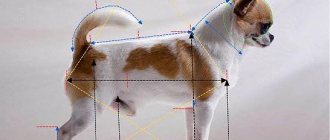When the decision to get a dog has been made, even the breed of the pet has been chosen, future dog owners are faced with the question: at what age can you take a puppy into your home? It is necessary to treat it especially carefully; not only how the puppy adapts to a new home, but also the health and character of the dog depends on the age of the animal. The Russian Cynological Federation tells you at what age you can buy a puppy.
“The examination of litters is carried out: for giant, large and medium breeds - no earlier than 45 days, for small breeds - no earlier than 60 days from the date of birth of the puppies, provided that the puppies have all erupted milk teeth; based on the results, metrics are drawn up, from this moment they can be officially sell. This does not mean at all that a puppy at this age is ready for independent life without a mother. I would not recommend adopting a puppy before he is 3 months old. By this age, he becomes quite flexible and will be able to adapt well to new conditions,” commented Vladimir GOLUBEV, President of the Russian Cynological Federation.
Which one?
All purebred dogs are divided into three types:
- The first type is the pet class. These are simple pets that do not have any special external characteristics and will not attend exhibitions or engage in breeding work. Such dogs are loyal friends and companions. Their price is low, however, it often depends on the breeder.
- The second type is the breeding class of dogs with high exterior characteristics. They take part in exhibitions, and if you approach them competently, it will not be difficult to obtain a high-quality headboard. Many representatives of this type are breeding animals, so they will cost more than the pet class.
- The third variety is exhibition or show class . There are not many such dogs; they can be called close to the ideal standard. Animals of this type are representatives of blue blood. Experts know them by name. Buying such a dog is not easy - you have to wait for months and years. At exhibitions they always take prizes, but in breeding they do not live up to expectations. Their prices are very high.
Who is better to get: a boy dog or a girl dog?
Often, choosing the sex of a pet is a very difficult question. They are asked by everyone who has already decided on the breed. Its emotional state and qualities depend on the gender of the pet. And it doesn’t matter who you decide to choose: a boy or a girl, the main thing is that this decision is conscious. You should not adopt a dog based on the residual principle - take a puppy that is left with the breeder. In this case, the risk of being disappointed in him is very high.
Before making a choice, it is worth taking into account a lot of nuances:
- In appearance, males look courageous, and they are larger than females.
Males are active and inquisitive, but emotionally they are more restrained. If you decide to get a male, you should be prepared for the fact that he will require long walks. On the street, he needs to sniff everything, leave his marks to mark his territory. Often they are attracted to the female sex, so they run away to bitches in heat while the owner is distracted for a minute. - As for bitches , the opposite is true. Females are not as demanding as males. In an emotional sense, they are soft, quickly become attached to the owner and are easy to train. A female puppy learns faster than a male puppy and there are no problems with her until a certain point.
- During heat (which happens 1-2 times a year, lasts 3 weeks), they can become capricious and disobedient, and begin to pick at food. On walks, they will attract males by all means. So here too you will have to be prepared to show strength of character!
- Another aspect that is worth paying attention to is sexual desire . It manifests itself to a greater extent in males. You must decide how it will be easier for you - re-educate the female every time after estrus or learn to control the male when he is in dire need of mating. Here a lot depends on the character of the owner himself.
- When choosing the gender of a puppy, it is important to take into account the personality traits that you have as an owner . Your lifestyle and preferences also play a big role.
Of course, in practice there are still a lot of difficulties in raising a male dog, but the main task will be to indicate leadership . If the upbringing is carried out correctly, in the future the male will be docile and obedient, which means that problems with walking and behavior in the house should not arise.
You need to understand the purpose of getting a dog - as a pet or as a future champion of international exhibitions. You should not pay attention to the standard formulations - females are obedient, and males are stubborn. In life, of course, this is not always the case. A big role is played by the breed of the dog, its character, temperament, as well as how the owner will raise it.
After the first heat, the dog's behavior may change , so it is very important to learn more about the psychology of dogs and learn to find a common language.
At what age is it better to take?
It is impossible to give a definite answer to this question - it all depends on the circumstances. It is worth considering clearly the pros and cons of a particular age:
- 1 month One of the main advantages is such an animal will cost less, since the breeder has not yet spent money on feeding. You will also have the opportunity to choose a suitable candidate from the entire litter.
As for the rest, then there are many disadvantages here – you need to protect such a pet from diseases until he receives the necessary vaccinations, the immunity of such a puppy is weak, since he ate his mother’s milk, and now he has to switch to food. You will have to create a veterinary passport for him yourself.The character of a puppy at this age is also very difficult to determine, so you can be very disappointed. It is worth playing with the animals from the litter to understand who behaves and how, if you want to choose a puppy for work and training in some activity.
- 45 days The breeder receives permission to sell and prepares documents for each puppy. At this moment, the bitches run out of milk, and the babies become stronger - their immunity is healthy. When buying such a pet, you do not need to be vaccinated , which means that the risk that he may get sick is minimal.
The only negative is the difficulty in determining the dog’s character. In appearance, it may seem that the puppy is lethargic and motionless, but in reality he can be quite active. At this age, the animal’s potential is not fully revealed. As for the price, the cost will be higher , since the breeder will spend money on vaccinations and obtaining a veterinary passport. - 4-6 months This decision will be good from all sides.
The puppy is already quite old, and you can immediately see his character and habits. But there is one thing - many buyers are sure that the puppy has serious problems, since he remained with the breeder until such an age. But you shouldn’t think that this makes it of poor quality and not worth buying. If you like his appearance and character, have a beautiful color and look completely healthy, you can safely buy such a dog. The price will be higher , since the breeder has already spent money on food, vaccinations and documents for the animal.
Age 45 days is considered ideal.
At what age can I take it?
1. if this is a dog for the soul , then the best decision is to take it at the age of 1.5-3 months 2. But, if this is a dog for work and service , then it is worth taking an older puppy, whose age is from 3 months . It will immediately show whether the puppy can cope with the task assigned to him.
33 top dog breeds for keeping in an apartment
Assess your financial capabilities.
The dog needs proper nutrition and veterinary care. All vaccinations and examinations at the veterinarian are paid. For full growth and development, as well as maintaining good health, you need to provide your dog with adequate nutrition. The basis of the dog’s diet should be super-premium food, consisting of natural meat, containing the correct balance of proteins, fats, vitamins and minerals. A large dog weighing from 35 to 65 kg requires 400-600 g of super-premium dry food per day. Medium-sized dogs weighing from 15 to 35 kg require 200-400 g of super-premium dry food per day. Are you able to provide such care? For a family with a modest budget, such expenses may be unnecessary!
Determining the healthiest and best of the litter
You can determine the physical condition of a puppy using the following criteria:
- His movements should be confident and free. The puppy should stand well on its hind legs. If there are problems with the limbs, then they are noticeable immediately - just watch the dog’s behavior.
- The coat color must be the same as the breed standards. It should be shiny and free of seals and bald spots.
- There should be no pus in the eyes - they are dry and shiny.
- The surface of the ear is always pink, it has no discharge or unpleasant odor.
- The nose is cool and wet, also without any discharge. It is undesirable for there to be pigmentation on its surface.
- The oral cavity is pale pink and there is no plaque on the tongue. You need to ask the owner if the puppy's mother has all her teeth. There should be 42 of them. You can check if necessary.
- The baby's abdomen should be smooth, but not bloated.
Legal side of the matter
Buying a purebred dog is a legal transaction and must comply with generally accepted legal standards.
Here are the factors that are important:
- When purchasing under a contract, you must carefully study all its parties, since this is the same legal document that has legal force.
- When selling a dog, the breeder gives guarantees for certain qualities. If the characteristics are not confirmed, the buyer has the right to demand a reduction in the price of the pet or to terminate the contract altogether.
- After purchasing a pet, you should insure it, since the owner is responsible for all its actions.
Thus, buying a puppy at any age has its positive and negative sides. But careful attitude and competent upbringing will allow you to raise a loyal and intelligent pet.
What questions should you ask a breeder when buying a puppy?
It is important to ask the breeder about how healthy the puppy is. Also be sure to look at the animal's passport to make sure there are no problems. The following are a number of questions:
- When were the vaccinations given? They are recorded in the veterinary passport. The first vaccination is given 8 weeks after birth, and the second - 21 days later .
- What vaccine is the puppy vaccinated with? He must receive comprehensive vaccinations.
- When should you get your next vaccination?
- Have you been vaccinated against rabies? Vaccinations are given according to different schedules - often the injection is given at 3 months, when the teeth change.
- How often should a puppy be treated for worms?
- When is the next deworming? Puppies undergo this procedure a month after birth, and also 10 days after the second vaccination.
- What drug is used for deworming? (meaning anthelmintic)
- What are the health characteristics of a puppy?
- What does he eat and what is the best thing to feed him? On what schedule? Your eating pattern changes with age, as does the number of servings.
- How many teeth does he have?
- Completeness of testes (in males)
- What are the characteristics of the animal’s psyche?
First vaccinations
The first vaccinations are given at approximately 2 months. By this time, the immunity received by the puppy from its mother’s milk is already beginning to weaken, and therefore, if the babies are not vaccinated in time, they will catch literally every infection.
As a rule, puppies, and even adult dogs, are given complex vaccines that protect them from several diseases at once..
Such diseases include leptospirosis, hepatitis, distemper, parainfluenza and enteritis - that is, the most dangerous infections for animals, which, even with early treatment, often end in the death of the pet.
CAREFULLY!
They are especially dangerous for puppies, and therefore it is very important to strictly follow the vaccination schedule suggested by your veterinarian.
Usually, the first vaccine is given at 8-9 weeks . Two weeks after it comes revaccination, which should not be skipped under any circumstances. After this, the dog is vaccinated at 6 and 12 months.
Starting at 12 weeks, the puppy will also need to be vaccinated against rabies..
What documents must the breeder provide?
When buying a puppy, the breeder or owner must draw up a Sales and Purchase Agreement and attach all the necessary documents to it. After signing such a document, the seller hands over the puppy to the buyer.
Make sure that you are given the following along with the puppy:
- Veterinary passport, which indicates the number of vaccinations and treatments against parasites, the number when the manipulations were carried out.
- Puppy metric or “puppy card”.
- Evidence of the presence of a chip (if any).
Information about the puppy and the seller must be the same as in the passport, and the pet must match the description! If the puppy has a chip, be sure to compare its number with what is listed on the documents.
7 Best Dog Breeds for Lazy Owners
About the importance of socialization
Socialization is a complex process as a result of which an animal’s personality is formed and its connections with the outside world are formed. All stages are important in this process, and incompleteness of at least one of them can lead to problems with communication, mental disorders and behavior of the animal.
The first stage of socialization begins between two and eight weeks of life. During this period, the puppy remembers its belonging to the species of those around it. A puppy that has been taken away from its mother early and raised and fed by humans may have problems interacting with other dogs.
Hurry up, choose a box and find out what gift awaits you
Discount on pet insurance
Promo code copied to clipboard
Adviсe
So, for your purchase to bring you pleasure in all its forms:
- Make sure your home is suitable for each breed of dog . If the dog is large, there should be plenty of room for it to move. If the house is small or you live in an apartment, then the barking of a big dog will drive not only you, but also your neighbors crazy. Having a backyard will create a place for your dog to play actively. After all, they love fresh air and games so much.
- Make sure you have enough money . This is not about money to buy a puppy. You must have money for food, visits to the veterinarian, and a hairdresser (if it is a long-haired dog). Also an important condition is the availability of free time. You need to not only walk with the dog, but also play. If you don’t devote time to her, she will get bored, and may even begin to damage furniture and things.
- Find a friend for your puppy . If you work a lot and spend little time at home, be sure to find a dog sitter. She will feed her, play with her and take her outside on demand. This way your dog will be happy and his character will be flexible.
- The dog can be naughty. In puppyhood, they all seem obedient and flexible. But some individuals can literally turn your house upside down. Be sure to think about what you can do with your dog at home to redirect his attention - buy special toys .
- If you already have other pets, think about how introductions will take place and whether your pet will accept the new family member . This should be done very carefully so as not to traumatize the animals’ psyche. Give them the opportunity to sniff each other and get used to it.
- Prepare your home for the arrival of the puppy and create a comfortable environment . Buy a small house or bed for your puppy. While on it, he will be able to relax and feel safe.
Assess your dog's future place of life.
If you live in a small apartment, then buying a St. Bernard is not a very reasonable decision. A large dog needs space; being crammed into a small, stuffy apartment is not the best living conditions for an animal. Of course, it is impossible to say that all large dogs are unhappy in small apartments, because a dog’s happiness lies in communication with its owner. A dog, like no other domestic animal, needs close contact with its owner, it identifies itself with him, its whole life consists of serving its owner. Therefore, lonely life on a chain in the spacious courtyard of a country house is much more unhappy for a dog than daily close contact with the owner in the space of a small apartment.











